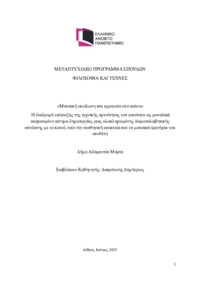- MSc thesis
- Φιλοσοφία και Τέχνες (ΦΙΤ)
- 27 Ιουλίου 2025
- Ελληνικά
- 110
- ΔΗΜΗΤΡΙΟΣ ΔΑΚΡΟΤΣΗΣ
- ΔΗΜΗΤΡΙΟΣ ΔΑΚΡΟΤΗΣ , ΣΤΑΣΙΝΟΣ ΣΤΑΥΡΙΑΝΕΑΣ
- Μουσική, Πιάνο, Πιανιστική τεχνική, Ερμηνεία, Εκτέλεση, Φιλοσοφία
- ΦΙΛΟΣΟΦΙΑ ΚΑΙ ΤΕΧΝΕΣ
- 7
- 43
-
-
Η παρούσα διπλωματική εργασία επιχειρεί να προσεγγίσει την έννοια της πιανιστικής
ερμηνείας και εκτέλεσης στο σύνολό της. Η βιβλιογραφική έρευνα εξετάζει τους παράγοντες που συντελούν, ώστε η απόδοση ενός μουσικού κειμένου να μπορεί να χαρακτηριστεί ως ουσιαστική και ολοκληρωμένη ερμηνεία. Διερευνάται σε βάθος η ιστορική εξέλιξη της πιανιστικής τέχνης, ώστε ο αναγνώστης να αντιληφθεί πώς διαμορφώθηκαν οι σύγχρονες ερμηνευτικές μέθοδοι. Μέσα από την ανάλυση του έργου κάποιων εκ των σημαντικότερων συνθετών, φιλοσόφων, πιανιστών, μουσικολόγων και θεωρητικών εξηγείται η σχεδόν μεταφυσική σύνδεση συνθέτη- ερμηνευτή- κοινού και κατ’ επέκταση ο κρίσιμος ρόλος του πιανίστα στην υλοποίηση τόσο του προσωπικού του μουσικού ιδανικού, όσο και του οράματος του συνθέτη. Η σύνδεση της μουσικής ερμηνείας με φιλοσοφικά ζητήματα, όπως η αξία της μουσικής και η αισθητική, συντελεί στην περαιτέρω κατανόηση της βαρύτητας του ζητήματος. Τέλος, παρέχονται κάποιες τεχνικές και ερμηνευτικές οδηγίες προς τους μελλοντικούς πιανίστες, οι οποίες ευχόμαστε να τους διευκολύνουν και να φωτίσουν τα σκοτεινά σημεία της μουσικής τέχνης. Εντούτοις, όπως θα καταστεί σαφές και από την εργασία, η πιανιστική ερμηνεία δεν μπορεί να εξαντληθεί σε τεχνικές οδηγίες, καθώς αυτές αποτελούν μόνο ένα πολύ μικρό μέρος της. Η ψυχή, το συναίσθημα και η νόηση αποτελούν τις σημαντικότερες πλευρές του ζητήματος και αυτές ακριβώς επιχειρήσαμε να προσεγγίσουμε. -
This thesis endeavors to approach, in its entirety, the concept of pianistic interpretation and performance. The literature review examines the factors that contribute to rendering a musical text in a manner that can be characterized as substantial and complete interpretation. The historical evolution of pianistic art is explored in depth, enabling the reader to comprehend how contemporary interpretive methods have been shaped. Through the analysis of the work of some of the most significant composers, philosophers, pianists, musicologists, and theorists, the almost metaphysical connection between composer, performer, and audience is elucidated—along with the pianist’s critical role in realizing both their own musical ideal and the composer’s artistic vision. The connection between musical interpretation and philosophical questions—such as the value of music and aesthetics—contributes to a deeper understanding of the significance of the subject. Finally, several technical and interpretive guidelines are offered to future pianists, with the hope that they may assist them and shed light on the more obscure aspects of musical art. Nevertheless, as the thesis will make evident, pianistic interpretation cannot be adequately conveyed through technical directives alone, as such guidance constitutes only a very small part of it. Soul, emotion, and intellect form the most essential dimensions of the matter—precisely those which this work has sought to explore.
-
- Hellenic Open University
- Αναφορά Δημιουργού 4.0 Διεθνές


